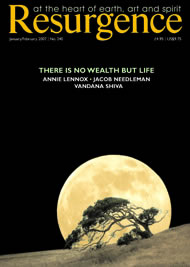LAST YEAR I was asked to participate in a new book on responsible travel, Green Places to Stay, and was lucky enough to visit and inspect some eco-hotels and lodges in Sri Lanka. I was really interested to see if there was any such thing as eco-tourism, in the age of mass air travel, and the thought of being able to stay in eco-hotels eased my own conscience somewhat.
I knew that the impact tourism has on developing countries, in particular, causes many problems. The habitat loss from golf courses and over-development; the consumer-oriented relationship that is often all one has with local people; the gas-guzzling, fume-spewing planes, automobiles and tuk-tuks that ferry us from A to B; the deforestation and damage to the pristine environments that one has come to see… These are all serious issues to countries whose own governments are often too mired in corruption and crisis to give even a passing nod to the sustainable tourism agenda. So I was really inspired to see that some enlightened individuals and businesses are striving to make a difference, to put eco-tourism on the map and to pass on best practice – which incidentally includes a seriously good bottom line – to others in the industry.
One such business is Jetwing in Sri Lanka, which owns a string of hotels on the island and is in the process of converting six of them into eco-hotels. The thoughtful attention to detail makes these hotels a joy to stay in, but behind the façade of locally printed bed linen, rattan baskets and handwoven rugs, the work that is being undertaken is really encouraging. For a start, all the hotels provide drinking water in glass bottles – or in some hotels, fresh water is provided from a central filter – thereby saving on the use of thousands of plastic, non-recycled bottles. The collected glass bottles can be reused and are sold to a local recycler, and the money is put in a staff welfare fund, which is used to provide school uniforms for staff children, for instance.
These hotels have installed their own waste-water treatment facilities, with the resulting grey water being used on the gardens, and the organic waste for fertiliser. Solar panels have been installed where possible and rainwater is collected for use on the gardens or in specially reconstructed wetland areas. Several of the hotels have their own organic gardens – one even has a farm – where fresh vegetables and food are grown for the kitchens, and where ‘wet waste’ from the kitchens is composted or used to feed the pigs. Some of these gardens have been subcontracted to local people, providing them with a living wage in return for fruit and vegetables. These hotels also have a local procurement policy so that goods and services are sourced locally whenever possible.
Every hotel has a ‘Naturalist’ who takes guests on guided walks or boat trips to local habitats, and further to rainforests and other sites of special interest. The Naturalists also work with local schools and communities, lecturing on the importance of bio-diversity, and schoolchildren are invited into the hotels to see the farms, gardens, wetlands and even cookery demonstrations.
One hotel in particular sticks in my mind because I was able to participate in a cloud-forest regeneration project. The hotel was sited in the central hilly region of Sri Lanka on an old tea plantation. The area had been completely deforested by the European plantation owners, but now the hotel staff are working towards reforesting the hills with indigenous saplings grown in their own nursery. For a small fee, guests can choose a sapling and help to replant the cloud forest.
What is more, going green really pays: cutting energy consumption, selling waste for recycling, and growing fruit and vegetables all help to cut costs. And these savings are used to make links between the business and the community: Jetwing funded the rebuilding of staff homes lost in the tsunami, they contribute towards local temple costs and they donate funds to local schools. Not, as cynics might think, to promote their business to potential young workers, but because they recognise that without the local community on board, trying to preserve the remaining beautiful and pristine habitats of Sri Lanka is a lost cause.
There is much that hotels throughout the world could learn from the example being set by Jetwing in Sri Lanka and the many others featured in Green Places to Stay. If only all hotels recycled their waste, used low-energy light bulbs, bought locally produced food and constructed wildlife habitats in their grounds. This book features a wide selection of wonderful places to stay that are putting sustainability into practice in one of the world’s largest and most polluting industries.
The argument about eco-tourism remains, and until such time as the aviation industry takes responsibility for its carbon emissions, and ticket prices reflect the true cost to the environment, it should be said that there is no such thing as eco-tourism. Yet the work of these companies is not tinkering at the edges. It is setting a precedent for the future of the industry. Others would do well to take note.
Visit www.seat61.com for information on how to travel to your chosen destination by train and/or ship.
Lorna Howarth is Co-editor of Resurgence, trustee of The Yarner Trust and a member of the Advisory Board for Artists’ Project Earth.








